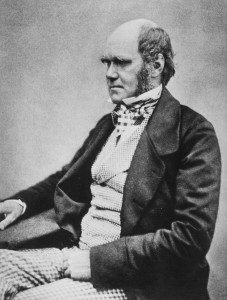Charles Darwin in 1854, at the age of 45; five years before the publication of The Origin of Species, which he wrote as a Christian [public domain / Wikimedia Commons]
This occurred in the combox of my post, Clarifications re: Atheist “Reductio” Paper., in August 2015. Ben McGrew‘s words will be in blue. He conducted himself admirably as a “gentleman and a scholar” the entire time.
* * * * *
Do you believe in evolution like many of your brothers and sisters?
If not, then I don’t think there is much more to say on this topic without opening a can of worms.
However, if you do, then you have a foundation for seeing complexity arise. At which point we have three things:
1) A set of poorly understood forces with testable qualities.
2) A process by which complexity can develop.
3) A condition which has been shown could be the direct or indirect result of such a process.
The conclusions are either:
a) This condition is purely the result of known processes
b) This condition is purely the result of an unknown process
c) This condition is the result of some combination of known and unknown processes.
If you believe a foreign entity is responsible for everything we can see, that is not incompatible with the belief that everything we see, other than origins, *could reasonably be* the result of a natural process in another setting.
For a functional world model to exist, it must be testable and demonstrable. The unique aspects of religious worldviews do not present any reliably predictive models.
My possible prerequisites for existence include the possibility of your own axioms, but are not limited by it. Would that not make it definitively *less* faith based?
I’m ultimately agnostic on the whole question. What I do positively believe is that evolution of everything we see is not possible according to the laws of science as we know them. But if God put the potentiality of all this evolution and design into matter, then it would be possible, but still not necessarily understood by a purely [materialistic / naturalistic] scientific model. Only theistic evolution would be possible.
I believe that God is necessary to explain both the laws of science and evolution and development of the universe and life.
Gradual evolution makes more intuitive sense to me than instant special creation of various species, but again, only if God is somehow involved. Materialistic evolution has serious difficulties, either under a gradual, classical Darwinian model or a punctuated equilibrium understanding (per Stephen Jay Gould).
In any event, my objection is infinitely more to materialism than to evolution. If the latter is true, it’s a yawner; if it isn’t, I don’t lose any sleep over it. I just think that God (or, Intelligent Design) is a necessary component of the creation of the universe.
Which parts of evolution do you feel is incompatible with the known laws of science? My fiance and I have combined degrees in Electrical Engineering and Vector-borne disease Ecology, so I might be able to address some of the common obstacles that arise in these kinds of conversations.
The whole process by which new structures are “created.” I don’t think random mutations are sufficient to explain that. I’ve always accepted that microevolution is demonstrated. We develop resistance and immunity; animals adapting to their surroundings with various changes, etc. Macroevolution is a different story.
Specifically, there are huge unknowns about all this at the cellular level, per the analyses of Michael Behe.
To address Michael Behe in particular. He has made a number of claims that have since been satisfactorily refuted, though may not provide all of the answers we’d like.
Obviously there will always be aspects of evolution which will require additional study, such is the nature of inspection.
Can you address a specific instance of macroevolution that you struggle with?
It sounds like you don’t believe ‘Science is incompatible with Evolution’, a la an apparent contradiction, so much as simply can’t see a complete picture from the pieces, thus conclude there isn’t a picture to be made.
Argument from Ignorance, so to speak.
If present laws of science can’t explain something, then one should admit that and remain agnostic.
I do that regarding macroevolution. It’s no different than what you guys do regarding the origin of the Big Bang and the universe. I’m just being more skeptical and demanding than you are. :-)
We just don’t know all the particulars, according to naturalistic science, in very important areas.
But the Christian refuses to exclude God from the whole equation.
So I say, “sure, evolution may very well be true, but at the present state of knowledge, I say that it is only possible through some supra-empirical intervention or initial impetus from God.”
Well, no. That is not really comparable. The “laws of science” are thus far entirely compatible with Evolution, we simply don’t have every single detail about our particular path. Thus why Evolution is a ‘Scientific Theory’.
The Big Bang and the universe are explicitly outside of our scientific laws, thus can not be determined at this point. That is freely admitted.
Saying that anything which we don’t understand must be due to a deity rather than may is precisely an argument from ignorance and would prevent us from actually finding any answers.
It’s not merely a lack of “every single detail about our particular path.” That’s true of any scientific theory or hypothesis. It’s the fact that the knowledge is missing at key and fundamental points.
Random mutations are not sufficient to explain the creation of entirely new structures. And how do they come about in the first place? Like Gould famously stated, “what good is half a wing?”
I understand that you will always think any belief in God is “argument from ignorance” and “God of the gaps.” You guys have plenty of gaps, too. You just pretend that you don’t, whereas you say that only Christians do, and that we arbitrarily invoke “God” as a desperate last-ditch attempt to explain the unknown.
It’s a lot more involved than that caricature! :-)
This gets back to my reductio. I say in reply that the atheist (here’s more satirical reductio: *****WARNING!*******) simply replaces “atom of the gaps” or “cell of the gaps” or “time of the gaps.” In a materialistic outlook, those things create absolutely everything there is.
If something is not yet understood, the atheist scientist in effect says, “given enough time, it’s entirely possible”: as if time itself is a creative agent. It’s not at all.
You place your faith in the inherent abilities of atoms to do all that we see; yet cannot explain how they do this, at the place of origins.
This is Behe’s ongoing argument. He explains the amazing subcellular processes and structures and then challenges scientists to tell us how these came about.
Since they come up with zero, he proposes (which is now philosophy / religion and not strictly science, because science isn’t the sum of all knowledge) that a higher intelligence did it.
Feel free to generalize my position all you’d like, but I’m here to actually address those key ‘gaps in knowledge’, if you care to personally explore them. There are definitely points of missing knowledge, which I can point you toward, but it sounds like you’re stuck on the layman’s traps, not the one’s actually being worked on by the scientific community.
And please note, that I’ve already addressed Michael Behe earlier. He has had a number of his claims already refuted. He isn’t the hero you seem to be portraying him as for your cause.
Don’t get caught up in old arguments.
Freebie:
If you’d like to talk to someone who has personally reviewed more Intelligent Design and Creationism articles than you’ve probably ever seen or ever will see, please check out the work of a friend of mine [link].
You might be amazed to find how few qualified people actually support the position.
What Christians believe is not “God of the gaps”: which is an atheist caricature. According to that, whenever we don’t know something or can’t figure it out, we shout “God” and think that solves the problem.
Less educated Christians do that, of course, but the educated ones know that belief in God can be rationally defended in many ways. There are 22 or so major theistic arguments.
So the accurate way to describe this is that we can defend God through reason and accept His existence on that basis (and in faith). That being the case, when we are talking about the universe, it is relevant to believe that God (already having been accepted on other grounds) comes into play.
That’s permitted because the Christians doesn’t assume that all knowledge is empirical. We don’t exclude God, as you do by your arbitrary, stunted categories of knowledge
But under an empirical-only model, obviously mentioning God is impermissible. That has nothing to do with science
(so we are told), which is rigidly defined as matter-only, excluding any non-material thing. Therefore, if we dare to mention Him in a creative capacity, you complain that this is anti-knowledge, anti-scientific, and “God of the gaps.”
That’s where you need to be more acquainted with the history of science, which was overwhelmingly theistic and Christian. Modern science, of course, began in a heavily Christian culture: the Middle Ages in Europe.
See my book on this topic.
* * *
God of the Gaps was was actually brought up by someone else who jumped into our conversation, though the topic would be related.
My issue if your line of thought there was that you said “Evolution wouldn’t work with the Scientific Laws as know them.” which is incorrect and not reflective of what you actually meant.
To say they wouldn’t work together implies a contradiction. (I was expecting you to mention the laws of thermodynamics or something equivalent.)
To simply say there are missing pieces within the Theory of Evolution has nothing to do with ‘Scientific Laws’. We would also need to discuss where you stand on the Theory of Gravity, which has just as many ‘holes’.
Nope. I’m not talking about missing links, but as I already said, key processes concerning how new structures can come into existence. I don’t think “random mutations” sufficiently explain that (nor the origins of DNA and life), and I’m not alone (not even among evolutionists).
I’d be delighted to discuss it more sometime.
-Majorly bites tongue-
Whenever you’re interested in having that discussion, please reach out to me if possible. It sounds like there is a lot to shed light on.
* * *
Many of you have been saying you don’t know how matter could create itself and organize itself / evolve into what we have today. But you believe it did (because everything is here).
You don’t have the slightest idea how it happened. But you believe it did.
Therefore, you have faith, according to what you said, yourself: “‘Faith’ is the belief in something which is not known or can not be known.”
What is the specific thing that is believed to be true despite a lack of evidence? Existence? That would seem to be self evident.
The mysterious process that brought everything in the universe about, from nothing (!!!).
Sure, if someone claims that there is a mysterious process from which the universe sprang, you’d be right.
That isn’t the default claim of atheism, nor is it mine.
Mine is that, “There are, minimally, equally viable alternatives to a deity, therefor I can not presume a deity to be the correct answer.”
~”Some atheists have faith, Atheism is not based on faith.”~
I would say that atheists view themselves as singularly guided by reason (usually with the implication that others are quite deficient in that regard).
When I look at them I say, “sure, they like reason and science, but neglect to see that science is a brand of philosophy, which reduces at bottom to unproven axioms and assumptions, like every other field of knowledge; therefore, the atheist must exercise ‘faith’ of this sort, which is not essentially different (though very different in many ways) from faith in God.”
This is an excellent discussion with you, Ben. I’m really enjoying it. It’s what I hoped to achieve in the other thread, but never did. But I ‘fess up to my share of the blame for that.
That has definitely become the mantra of mainstream ‘Atheism’, regrettably…
At the beginning of the ‘movement’ for atheism to become more prominent, it was far more common to find the intellectuals who defended reason above faith with civility and properly upholding some number of virtues. It would seem any any ideology that becomes large enough suffers from a parasitic crowd that attaches itself for the free ride without actually holding on to the core principles.
As much as I wish atheism could become a prominent player in the future, I think its inevitable role will simply be to serve as a balance for the current religious majority. Deflating its ego whenever gnosticism gets out of hand.













